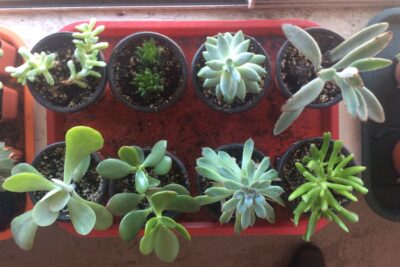
Licensing Requirements for Selling Succulents: What You Need to Know

Selling succulents has become an increasingly popular business venture in recent years. With their low maintenance and unique aesthetic appeal, succulents have found their way into the hearts and homes of many plant enthusiasts. However, before diving headfirst into the world of succulent sales, it is important to understand the licensing requirements that may apply to this industry.
We will explore the various licensing requirements for selling succulents. We will discuss the different types of licenses that may be necessary, such as a general business license or a nursery license. Additionally, we will delve into the specific regulations and guidelines that may need to be followed when selling succulents, including any restrictions on importing or exporting certain species. By understanding these requirements, aspiring succulent sellers can ensure that they are operating their business legally and responsibly.
- Determine the specific licensing requirements for selling succulents in your jurisdiction
- Research and understand any permits or certifications needed to legally sell succulents
- Contact local government agencies or agricultural departments for information on licensing
- Ensure compliance with any zoning regulations or restrictions related to selling plants
- Obtain a business license or register your business to sell succulents
- Educate yourself on any specific labeling or packaging requirements for succulents
- Follow any guidelines or regulations related to the transportation or shipping of succulents
- Keep accurate records of your sales and transactions for tax purposes
- Stay informed about any changes or updates to licensing requirements for selling succulents
- Frequently Asked Questions
Determine the specific licensing requirements for selling succulents in your jurisdiction
When it comes to selling succulents, it's important to understand the licensing requirements specific to your jurisdiction. These requirements can vary depending on the location and the scale of your business. By familiarizing yourself with the necessary licenses, you can ensure that you are operating legally and avoid any potential legal issues.
Research your local regulations
Start by researching the regulations and licensing requirements for selling plants in your specific area. This may include checking with your local government or agricultural department, as well as understanding any state or provincial laws that apply. Be thorough in your research to ensure you have a comprehensive understanding of what is required.
Obtain a general business license
In most cases, you will need to obtain a general business license to legally sell succulents. This license allows you to operate your business and is typically obtained from your local government or municipality. The requirements and application process may vary, so be sure to check with the appropriate authorities in your area.
 Exploring Trendy Succulent Slang on Urban Dictionary
Exploring Trendy Succulent Slang on Urban DictionaryConsider a nursery license
If you plan on selling a large quantity of succulents or operating a nursery, you may need to obtain a nursery license. This license is typically required for businesses that grow and sell plants on a larger scale. It ensures compliance with specific regulations related to plant health and safety. Contact your local agricultural department or relevant authorities to inquire about the specific requirements for obtaining a nursery license.
Understand sales tax obligations
In addition to obtaining the necessary licenses, it's important to understand your sales tax obligations. Depending on your jurisdiction, you may be required to collect and remit sales tax on the succulents you sell. Consult with a tax professional or your local tax authority to ensure you are compliant with all sales tax regulations.
Keep records and documentation
Once you have obtained the necessary licenses, it's crucial to keep records and documentation of your compliance. This includes maintaining accurate sales records, invoices, and any other relevant paperwork. Not only will this help you stay organized, but it will also be essential in the event of any audits or inquiries.
Remember, licensing requirements for selling succulents can vary depending on your jurisdiction, so it's crucial to do your research and ensure you are complying with all applicable regulations. By obtaining the necessary licenses and staying informed, you can run a successful succulent business while operating within the legal framework.
 Join a Local Succulent Club and Connect with Fellow Plant Lovers
Join a Local Succulent Club and Connect with Fellow Plant LoversResearch and understand any permits or certifications needed to legally sell succulents
When it comes to selling succulents, it's important to be aware of the licensing requirements and regulations that may apply. This will ensure that you are operating your business legally and avoid any potential fines or penalties.
1. Check with your local government
Start by researching the requirements set by your local government. Depending on where you live, there may be specific permits or licenses needed to sell plants, including succulents. Contact your local city or county office to inquire about any necessary paperwork or regulations.
2. Obtain a nursery license
In many cases, selling succulents may require a nursery license. This license is typically issued by the state or local agricultural department and ensures that your business is complying with the necessary regulations to sell plants. Check with your state's agricultural department to determine if a nursery license is required and how to obtain one.
3. Research specific regulations for succulents
While general nursery licenses may cover the sale of succulents, it's important to research any specific regulations that may apply to these plants. Some states or counties may have additional requirements for the sale of certain plant species or invasive plants. Stay informed about any restrictions or guidelines that may affect your ability to sell succulents legally.
 Alien Cuisine: Exploring E.T.'s Edible Fingers
Alien Cuisine: Exploring E.T.'s Edible Fingers4. Consider certifications for organic or sustainable practices
If you plan to market your succulents as organic or sustainably grown, you may want to consider obtaining certifications to support these claims. Certifications such as USDA Organic or Certified Naturally Grown can provide credibility and attract customers who prioritize environmentally friendly options. Research the requirements and process for obtaining these certifications if applicable to your business.
5. Stay updated on changes and renewal requirements
Once you have obtained the necessary licenses and permits, it's essential to stay informed about any changes in regulations or renewal requirements. Set reminders to renew your licenses on time and regularly check for updates from your local government or agricultural department to ensure ongoing compliance.
By researching and understanding the licensing requirements for selling succulents, you can confidently operate your business within legal boundaries. Remember to always stay informed about any specific regulations or certifications that may apply to your area or business practices.
Contact local government agencies or agricultural departments for information on licensing
Before you start selling succulents, it's important to understand the licensing requirements in your area. The regulations and permits needed can vary depending on where you live and the type of business you plan to operate. To ensure that you are compliant with the law, it is recommended to contact your local government agencies or agricultural departments for specific information on licensing.
 Are Horse Teeth Succulent? Exploring the Palatability Myth
Are Horse Teeth Succulent? Exploring the Palatability MythWhy is licensing necessary?
Licensing is a crucial aspect of running a business as it ensures that you meet certain standards and regulations set by your local authorities. It helps maintain the integrity of the industry, protects consumers, and promotes fair competition among businesses. By obtaining the necessary licenses, you demonstrate your commitment to operating legally and responsibly.
Where to find licensing information?
The best way to determine the licensing requirements for selling succulents is to reach out to your local government agencies or agricultural departments. These entities are responsible for enforcing regulations related to plant sales and can provide you with the most accurate and up-to-date information.
How to contact local government agencies or agricultural departments?
Here are a few steps you can take to get in touch with the relevant authorities:
- Start by researching the official website of your city or county government. Look for a section that specifically addresses licenses and permits for businesses.
- If you can't find the information you need online, try calling the main phone number listed on the government website. Ask for the department or division responsible for licensing businesses in the agricultural or horticultural sector.
- Alternatively, you can visit the local government office in person and inquire about the licensing requirements for selling succulents. The staff will be able to guide you through the process and provide you with the necessary forms and instructions.
Important considerations
 Delicious Burrito Tail Recipes Packed with Succulent Goodness
Delicious Burrito Tail Recipes Packed with Succulent GoodnessWhen contacting local government agencies or agricultural departments, remember to:
- Ask specific questions regarding the licenses or permits you need to sell succulents.
- Take note of any deadlines, fees, or additional requirements associated with the licensing process.
- Clarify whether there are any restrictions on the types of succulents you can sell or the locations where you can operate your business.
- Keep a record of all the information you gather, including any reference numbers or contact details provided by the authorities.
By proactively seeking licensing information and fulfilling the necessary requirements, you can ensure a smooth and legal operation of your succulent-selling business.
When considering selling succulents, it is crucial to ensure compliance with any zoning regulations or restrictions that may be in place. These regulations vary from locality to locality, so it is important to research and understand the specific requirements in your area.
Some areas may have restrictions on selling plants from residential properties or may require special permits for selling plants at farmers' markets or other public venues. It is essential to familiarize yourself with these regulations to avoid any potential legal issues.
Additionally, certain areas may have limitations on the types of plants that can be sold. Some succulents may be considered invasive species in certain regions, and selling them may be prohibited. It is crucial to identify and comply with any such restrictions to ensure you are selling legally and ethically.
Key Considerations:
 How to Pronounce the Word "Succulent": A Quick Guide
How to Pronounce the Word "Succulent": A Quick Guide- Research and understand zoning regulations in your area.
- Identify any restrictions on selling plants from residential properties.
- Obtain any necessary permits for selling plants at public venues.
- Comply with limitations on selling certain types of plants.
Obtain a business license or register your business to sell succulents
If you're planning to sell succulents, it's important to ensure that you comply with all the necessary licensing requirements. This will not only help you establish your business legally but also give you peace of mind knowing that you're operating within the bounds of the law.
One of the first steps you need to take is to obtain a business license or register your business. This process may vary depending on your location and the specific regulations set by your local government. It's crucial to research and understand the requirements specific to your area.
In some cases, you may need to obtain a general business license that covers all types of businesses. This license ensures that you have met the basic legal requirements to operate a business within your jurisdiction.
However, certain areas may have additional regulations specifically for selling plants or horticultural products. In such cases, you may need to obtain a specialized license or permit that allows you to sell succulents specifically.
Research your local regulations
Before starting the process of obtaining a business license or registering your business, it's essential to thoroughly research the local regulations. This includes checking with your city or county government offices, as well as any relevant state or federal agencies.
Some key aspects to consider when researching licensing requirements include:
- Specific licenses or permits required for selling plants or horticultural products
- Any restrictions on selling certain species of succulents
- Zoning restrictions or permits related to operating a retail business
- Health and safety regulations for handling and selling plants
By understanding and complying with these regulations, you can avoid potential fines or penalties and ensure the smooth operation of your succulent business.
 Delicious and Easy Chicken and Hen Recipes to Satisfy Your Cravings
Delicious and Easy Chicken and Hen Recipes to Satisfy Your CravingsSeek professional advice if needed
If you find the licensing requirements overwhelming or confusing, don't hesitate to seek professional advice. Consulting with a business attorney or an accountant who specializes in small businesses can provide you with valuable guidance.
They can help you navigate the legalities and ensure that you have met all the necessary licensing requirements. Additionally, they can assist you in understanding any tax obligations that may be associated with selling succulents as a business.
Remember, it's better to invest in professional advice upfront rather than facing legal complications down the line.
Conclusion
Obtaining the necessary licenses or registrations is an essential step in establishing a legal and successful succulent business. By researching and understanding your local regulations, you can ensure that you're operating within the law and avoid any potential issues. Don't hesitate to seek professional advice if needed, as it can provide you with valuable insights and guidance.
Educate yourself on any specific labeling or packaging requirements for succulents
Labeling Requirements
When it comes to selling succulents, there may be specific labeling requirements that you need to adhere to. These regulations are in place to ensure that consumers are provided with accurate and relevant information about the plants they are purchasing. It's essential to educate yourself on these requirements to avoid any legal issues or customer dissatisfaction.
 Pet-Friendly Succulents: Exploring Spiked Varieties Safe for Pets
Pet-Friendly Succulents: Exploring Spiked Varieties Safe for PetsOne important aspect of labeling is to clearly identify the type of succulent you are selling. This information can help customers make informed decisions based on their preferences and care abilities. Additionally, you may need to include details about the plant's origin, such as whether it's locally grown or imported.
Furthermore, consider including care instructions on the label. Succulents have specific needs, and providing guidance on watering, light exposure, and temperature requirements can be beneficial for your customers. This information can help them keep their succulents healthy and thriving.
It's also crucial to include any relevant warnings or precautions on the label. Some succulents may have sharp spines or be toxic to pets, which should be clearly stated to ensure the safety of your customers and their household members.
Packaging Requirements
In addition to labeling, there may be specific packaging requirements that you need to meet when selling succulents. These regulations aim to protect the plants during transportation and ensure they reach customers in optimal condition.
One common packaging requirement for succulents is to use secure and protective containers that prevent damage during transit. This may include using sturdy boxes, cushioning materials, or individual plant sleeves. Proper packaging not only protects the succulents but also enhances the overall customer experience.
Consider adding a layer of insulation to protect the plants from temperature extremes. Succulents are sensitive to temperature fluctuations, so using insulating materials like bubble wrap or Styrofoam can help maintain a stable environment during shipping.
Additionally, if you are selling succulents online or through mail-order, it's crucial to ensure that the packaging is leak-proof. This prevents any soil or water from leaking out and causing a mess during shipping. Sealing the containers properly can save your customers from unnecessary hassle and maintain the integrity of the plants.
 Discover Discounts at The Succulent Depot!
Discover Discounts at The Succulent Depot!Understanding and complying with the labeling and packaging requirements for selling succulents is essential for a successful and legally compliant business. By educating yourself about these regulations, you can provide accurate information to your customers and ensure the safe transportation of your plants. Remember to check with local authorities or industry organizations for any specific licensing requirements in your area.
When it comes to selling succulents, it's important to be aware of and follow any guidelines or regulations related to the transportation or shipping of these plants. This is particularly important if you plan on selling succulents online or shipping them to customers.
First and foremost, it's crucial to ensure that the succulents you are selling are legal to transport or ship. Some succulents may be protected by laws and regulations, especially if they are considered endangered or threatened species. It's important to research and understand the legal requirements for the specific types of succulents you plan on selling.
Additionally, you may need to obtain certain permits or licenses to transport or ship succulents. These requirements can vary depending on your location and the destination of the shipment. It's essential to check with your local authorities or relevant regulatory agencies to determine if any permits or licenses are necessary.
Basic guidelines for shipping succulents
- Proper packaging: Succulents should be securely packaged to prevent damage during transit. Use materials such as bubble wrap or packaging peanuts to ensure the plants are well-protected.
- Consider weather conditions: Extreme temperatures can be detrimental to succulents. During hot weather, consider using heat packs or insulation to protect the plants from excessive heat. In colder weather, use heat packs or insulation to prevent the plants from freezing.
- Choose a reliable shipping carrier: Select a trusted shipping carrier with experience in handling live plants. They should have proper systems in place to ensure the safe and timely delivery of your succulents.
- Provide care instructions: Include detailed care instructions with the shipment to guide recipients on how to care for their new succulents upon arrival.
By following these guidelines and adhering to any licensing or permit requirements, you can ensure that your succulent business operates legally and responsibly. Remember to stay updated on any changes in regulations or guidelines to ensure compliance with the latest requirements.
 Cat-Friendly Succulents: Safe for Claws, Where to Find
Cat-Friendly Succulents: Safe for Claws, Where to FindKeep accurate records of your sales and transactions for tax purposes
When selling succulents, it is crucial to keep accurate records of your sales and transactions for tax purposes. This not only helps you stay organized but also ensures that you are compliant with the licensing requirements in your area.
Why is it important to keep accurate records?
Keeping accurate records of your sales and transactions is essential for several reasons:
- Compliance with tax regulations: Proper documentation allows you to accurately report your income and expenses when filing taxes.
- Evidence of legitimacy: Having detailed records of your sales and transactions demonstrates that you are running a legitimate business.
- Inventory management: Accurate records help you keep track of your inventory, allowing you to make informed decisions about restocking and pricing.
- Financial analysis: By tracking your sales and expenses, you can analyze the financial health of your business and identify areas for improvement.
What records should you keep?
Here are some important records to maintain:
- Sales receipts: Keep a record of each sale, including the date, customer information, and the items sold.
- Purchase receipts: Retain receipts for any succulents or supplies you purchase for your business.
- Expenses: Keep track of any expenses related to your business, such as packaging materials, shipping costs, or advertising expenses.
- Bank statements: Regularly review your bank statements to ensure all transactions are accounted for.
- Tax documents: Maintain copies of your tax returns, as well as any relevant tax forms or documentation.
How long should you keep your records?
The length of time you should keep your records depends on your local tax laws and regulations. In general, it is recommended to retain your records for at least three to seven years. However, consulting with a tax professional or accountant can provide you with specific guidance based on your location.
Organizing your records
To keep your records organized, consider using a digital or physical filing system. Separate your records by year and category, making it easier to locate specific documents when needed. Additionally, consider using accounting software or apps to help streamline the record-keeping process, ensuring accuracy and efficiency.
By keeping accurate records of your sales and transactions, you not only fulfill your legal obligations but also gain valuable insights into the financial aspect of your succulent business. Stay organized, stay compliant, and watch your business thrive!
Stay informed about any changes or updates to licensing requirements for selling succulents
When it comes to selling succulents, it's important to be aware of the licensing requirements that may apply to your business. These requirements can vary depending on your location and the specific regulations set by your local government or agricultural department.
Staying informed about any changes or updates to licensing requirements is crucial to ensure that you are operating your succulent business legally and avoiding any potential penalties or legal issues.
Why do you need a license to sell succulents?
Obtaining a license to sell succulents is necessary because it helps regulate the trade of these plants and ensures that they are being sold by reputable and knowledgeable sellers. Licensing requirements are put in place to protect both the consumers and the environment.
By obtaining a license, you are demonstrating that you understand the proper care and cultivation of succulents, and that you are aware of any potential pests or diseases that could harm these plants. This helps maintain the health and integrity of the succulent market.
Research your local licensing requirements
Each country, state, or even city may have its own specific licensing requirements for selling succulents. It is essential to research and understand the regulations that apply to your particular location.
Start by contacting your local government or agricultural department to inquire about the necessary licenses and permits. They will be able to provide you with the most accurate and up-to-date information regarding the specific requirements for selling succulents in your area.
Common licensing requirements for selling succulents
While the specific licensing requirements may vary, there are some common ones that you should be aware of:
- Nursery License: In many cases, selling succulents falls under the category of operating a plant nursery. Therefore, you may need to obtain a nursery license, which demonstrates that you are authorized to sell plants.
- Seller's Permit: A seller's permit, also known as a sales tax permit, is necessary if you plan to sell succulents to the public. This permit allows you to collect and remit sales tax on your sales.
- Business License: Depending on the size and scope of your succulent business, you may need a general business license. This license ensures that you are operating legally and following all applicable laws and regulations.
Stay updated
It's crucial to stay updated on any changes or updates to licensing requirements for selling succulents. Regulations can evolve over time, so make sure to regularly check for any new information or amendments that may affect your business.
Consider joining local horticultural or plant trade associations, as they often provide valuable resources and updates on licensing requirements for their members. Additionally, subscribing to newsletters or following relevant government websites can also help you stay informed.
Remember, compliance with licensing requirements is essential for the success and longevity of your succulent business. By staying informed and ensuring that you have the necessary licenses and permits, you can confidently sell succulents while adhering to legal and ethical standards.
Frequently Asked Questions
1. Do I need a license to sell succulents?
It depends on your location. Some states or countries may require a license for selling plants, including succulents. Check with your local government or agricultural department for specific requirements.
2. What type of license do I need to sell succulents?
The type of license you need will vary depending on your location. It may be a general business license, a nursery license, or a plant dealer license. Contact your local authorities to determine the specific license required for selling succulents.
3. Are there any restrictions on selling succulents online?
There may be specific regulations or restrictions for selling plants online, including succulents. It is important to research and comply with any relevant laws regarding online plant sales, such as shipping regulations or import/export restrictions.
4. Do I need a license to sell succulents at local markets or events?
Again, this will depend on your location. Some local markets or events may require vendors to have a license to sell plants, while others may not have specific requirements. Contact the organizers of the market or event to inquire about any necessary licenses or permits.
If you want to read more articles similar to Licensing Requirements for Selling Succulents: What You Need to Know, you can visit the Miscellaneous category.






You Must Read